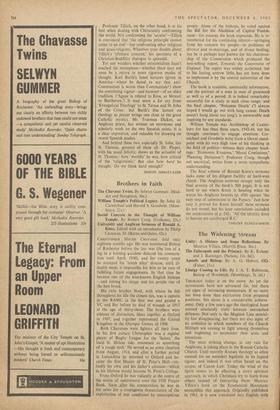Brothers in Faith
Social Concern in the Thought of William Temple. By Robert Craig. (Gollancz, 25s.)
. University and Anglican Sermons of Ronald A. Knox. Edited with an introduction by Philip Caraman, Si. (Burns and Oates, 42s.) CHRISTOPHER MAUDE CHAVASSE died only eighteen months ago. He was nominated Bishop of Rochester before the last war (the loss of a leg in a boating accident delayed his consecra- tion until April, 1940), and for twenty years he stumped his 'bomb alley' diocese, until ill- health made it impossible for him to be sure of fulfilling future engagements. In that time he became one of the best-known English bishops —and among his clergy and his people one of the best-loved.
His twin brother Noel, with whom he felt throughout his life the closest ties, was a captain in the RAMC in the first war and gained a VC and Bar before he died of wounds in 1917 at the age of thirty-three. The brothers were athletes of distinction, blues together at Oxford in 1907, and together represented the United Kingdom in the Olympic Games of 1908.
Both Chavasses were fighters air their lives. In his first curacy Christopher was a regular player of Rugby League for the 'Saints,' the local St. Helens side, renowned as something of 'a rough mob.' He served as an army chaplain from August, 1914, and after a further period in Lancashire he returned to Oxford and be- came the first Master of St. Peter's Hall—vir- tually his own and his father's creation—which in his lifetime would become St. Peter's College.
From Oxford he was valiantly at the centre of the storm of controversy over the 1928 Prayer Book. Soon after his consecration he was in the news for a courageous denunciation of the exploitation of war conditions by unscrupulous people. Alone of the bishops, he voted against the Bill for the Abolition of Capital Punish- ment—for reasons the book expounds. He is re- membered for his continuing interest—springing from his concern for people—in problems of divorce and re-marriage, and of divine healing; but he is perhaps best known for his chairman- ship of the Commission which produced the best-selling report, Towards the Conversion of England. The report was widely acclaimed, but to his lasting sorrow little, has yet been done to implement it by the central authorities of the Church.
The book is readable, continually informative, and the portrait of a man (a man of greatness) as well as of a period. It is indeed remarkably successful for a study at such close range; and the final chapter, 'Welcome Death' CI always hoped I would go out with lung cancer. Death doesn't hang about too long'), is memorable and inspiring by any standards.
William Temple was Archbishop of Canter- bury for less than three years, 1942-44, but his thought continues to engage attention. Car- michael and Goodwin write from a liberal stand- point with no very high view of his thinking in the field of politics—witness their chapter head- ings: 'Economic Evasions,' Moral Confusions,' `Planning Delusions'! Professor Craig, though not uncritical, writes from a more sympathetic understanding.
The final volume of Ronald Knox's sermons lacks none of his diligent facility or hard-won charm. The Anglican sermons occupy only the final seventy of the book's 500 pages. It is not hard to see where Knox is heading when he warns his Anglican hearers (p. 450) against 'the easy step of submission to the Papacy.' Just how easy it proved for Knox himself these sermons do not reveal; but his later convictions included the sectarianism of p. 242: 'All the identity discs in heaven are surcharged R.C.'
TIMOTHY DUDLEY-SMITH






































 Previous page
Previous page